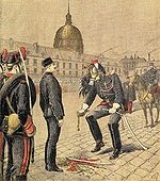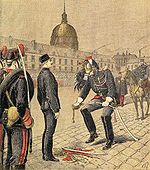
Degradation Ceremony
Encyclopedia

Ritual
A ritual is a set of actions, performed mainly for their symbolic value. It may be prescribed by a religion or by the traditions of a community. The term usually excludes actions which are arbitrarily chosen by the performers....
dismissal of an individual from some position of responsibility for discipline
Discipline
In its original sense, discipline is referred to systematic instruction given to disciples to train them as students in a craft or trade, or to follow a particular code of conduct or "order". Often, the phrase "to discipline" carries a negative connotation. This is because enforcement of order –...
.
It is especially associated with the dismissal of military
Military
A military is an organization authorized by its greater society to use lethal force, usually including use of weapons, in defending its country by combating actual or perceived threats. The military may have additional functions of use to its greater society, such as advancing a political agenda e.g...
officers
Officer (armed forces)
An officer is a member of an armed force or uniformed service who holds a position of authority. Commissioned officers derive authority directly from a sovereign power and, as such, hold a commission charging them with the duties and responsibilities of a specific office or position...
of high rank
Military rank
Military rank is a system of hierarchical relationships in armed forces or civil institutions organized along military lines. Usually, uniforms denote the bearer's rank by particular insignia affixed to the uniforms...
. Cashiering sometimes involved public degradation, with the destruction of symbols of status
Social status
In sociology or anthropology, social status is the honor or prestige attached to one's position in society . It may also refer to a rank or position that one holds in a group, for example son or daughter, playmate, pupil, etc....
: epaulette
Epaulette
Epaulette is a type of ornamental shoulder piece or decoration used as insignia of rank by armed forces and other organizations.Epaulettes are fastened to the shoulder by a shoulder strap or "passant", a small strap parallel to the shoulder seam, and the button near the collar, or by laces on the...
s ripped off shoulders, badge
Badge
A badge is a device or fashion accessory, often containing the insignia of an organization, which is presented or displayed to indicate some feat of service, a special accomplishment, a symbol of authority granted by taking an oath , a sign of legitimate employment or student status, or as a simple...
s and insignia
Insignia
Insignia or insigne pl -nia or -nias : a symbol or token of personal power, status or office, or of an official body of government or jurisdiction...
stripped, sword
Sword
A sword is a bladed weapon used primarily for cutting or thrusting. The precise definition of the term varies with the historical epoch or the geographical region under consideration...
s broken, cap
Cap
A cap is a form of headgear. Caps have crowns that fit very close to the head and have no brim or only a visor. They are typically designed for warmth and, when including a visor, blocking sunlight from the eyes...
s knocked away, and medal
Medal
A medal, or medallion, is generally a circular object that has been sculpted, molded, cast, struck, stamped, or some way rendered with an insignia, portrait, or other artistic rendering. A medal may be awarded to a person or organization as a form of recognition for athletic, military, scientific,...
s torn out and dashed upon the ground.
In addition, in the era when British Army
British Army
The British Army is the land warfare branch of Her Majesty's Armed Forces in the United Kingdom. It came into being with the unification of the Kingdom of England and Scotland into the Kingdom of Great Britain in 1707. The new British Army incorporated Regiments that had already existed in England...
officers generally bought their commissions
Sale of commissions
The sale of commissions was a common practice in most European armies where wealthy and noble officers purchased their rank. Only the Imperial Russian Army and the Prussian Army never used such a system. While initially shunned in the French Revolutionary Army, it was eventually revived in the...
, being cashiered meant that the amount they had paid was lost, as they could not "sell-out" afterwards.
Cashiering is associated with stigmatisation
Social stigma
Social stigma is the severe disapproval of or discontent with a person on the grounds of characteristics that distinguish them from other members of a society.Almost all stigma is based on a person differing from social or cultural norms...
and disgrace. The phrase degradation ceremony was applied by sociologist Harold Garfinkel
Harold Garfinkel
Harold Garfinkel was a Professor Emeritus at the University of California, Los Angeles. He is known for establishing and developing ethnomethodology as a field of inquiry in sociology.-Biography:...
to any act of public communication whose intent is to stigmatise the subject(s) as being unworthy of the normal privileges of their previous role in a society or institution.
Famous victims of cashiering include Alfred Dreyfus
Alfred Dreyfus
Alfred Dreyfus was a French artillery officer of Jewish background whose trial and conviction in 1894 on charges of treason became one of the most tense political dramas in modern French and European history...
(see trial and conviction of Alfred Dreyfus
Trial and conviction of Alfred Dreyfus
The trial and conviction of Alfred Dreyfus was the event that instigated the Dreyfus Affair, a political scandal which divided France during the 1890s and early 1900s. It involved the wrongful conviction for treason of Alfred Dreyfus, a French artillery officer of Alsatian Jewish background...
and Dreyfus affair
Dreyfus Affair
The Dreyfus affair was a political scandal that divided France in the 1890s and the early 1900s. It involved the conviction for treason in November 1894 of Captain Alfred Dreyfus, a young French artillery officer of Alsatian Jewish descent...
), Philippe Pétain
Philippe Pétain
Henri Philippe Benoni Omer Joseph Pétain , generally known as Philippe Pétain or Marshal Pétain , was a French general who reached the distinction of Marshal of France, and was later Chief of State of Vichy France , from 1940 to 1944...
, Thomas Cochrane, 10th Earl of Dundonald
Thomas Cochrane, 10th Earl of Dundonald
Admiral Thomas Cochrane, 10th Earl of Dundonald, 1st Marquess of Maranhão, GCB, ODM , styled Lord Cochrane between 1778 and 1831, was a senior British naval flag officer and radical politician....
(after the Great Stock Exchange Fraud of 1814
Great Stock Exchange Fraud of 1814
The Great Stock Exchange Fraud of 1814 was a hoax or fraud centered on false information about the then-ongoing Napoleonic Wars, affecting the London Stock Exchange in 1814.-The du Bourg hoax:...
), and Francis Mitchell
Francis Mitchell
Francis Mitchell was the last British knight of the realm to be publicly degraded , after being found guilty of extorting money from licensees via his monopoly on the licensing of inns....
.
In fiction
Cashiering is mentioned in Rudyard Kipling'sRudyard Kipling
Joseph Rudyard Kipling was an English poet, short-story writer, and novelist chiefly remembered for his celebration of British imperialism, tales and poems of British soldiers in India, and his tales for children. Kipling received the 1907 Nobel Prize for Literature...
poem "Danny Deever
Danny Deever
Danny Deever is an 1890 poem by Rudyard Kipling, one of the first of the Barrack-Room Ballads. It received wide critical and popular acclaim, and is often regarded as one of the most significant pieces of Kipling's early verse. The poem, a ballad, describes the execution of a British soldier in...
", in which a British soldier in India
British Raj
British Raj was the British rule in the Indian subcontinent between 1858 and 1947; The term can also refer to the period of dominion...
is cashiered before being hanged
Hanging
Hanging is the lethal suspension of a person by a ligature. The Oxford English Dictionary states that hanging in this sense is "specifically to put to death by suspension by the neck", though it formerly also referred to crucifixion and death by impalement in which the body would remain...
for murder
Murder
Murder is the unlawful killing, with malice aforethought, of another human being, and generally this state of mind distinguishes murder from other forms of unlawful homicide...
.
In the cartoon Fresh Hare
Fresh Hare
Fresh Hare is a Warner Bros. theatrical Merrie Melodies cartoon. It was directed by Isadore "Friz" Freleng, written by Michael Maltese, and produced by Leon Schlesinger...
, Bugs Bunny
Bugs Bunny
Bugs Bunny is a animated character created in 1938 at Leon Schlesinger Productions, later Warner Bros. Cartoons. Bugs is an anthropomorphic gray rabbit and is famous for his flippant, insouciant personality and his portrayal as a trickster. He has primarily appeared in animated cartoons, most...
is being chased by Elmer Fudd
Elmer Fudd
Elmer J. Fudd/Egghead is a fictional cartoon character and one of the most famous Looney Tunes characters, and the de facto archenemy of Bugs Bunny. He has one of the more disputed origins in the Warner Bros. cartoon pantheon . His aim is to hunt Bugs, but he usually ends up seriously injuring...
, in this case an officer with the Royal Canadian Mounted Police
Royal Canadian Mounted Police
The Royal Canadian Mounted Police , literally ‘Royal Gendarmerie of Canada’; colloquially known as The Mounties, and internally as ‘The Force’) is the national police force of Canada, and one of the most recognized of its kind in the world. It is unique in the world as a national, federal,...
. Bugs impersonates a senior officer and cashiers Elmer, not only tearing off his insignia and decorations but also his buttons and the rest of his uniform, even his undershorts
In the movie "Mary Poppins
Mary Poppins
Mary Poppins is a series of children's books written by P. L. Travers and originally illustrated by Mary Shepard. The books centre on a magical English nanny, Mary Poppins. She is blown by the East wind to Number Seventeen Cherry Tree Lane, London and into the Banks' household to care for their...
" when a British banker is fired, a version of cashiering occurs: the members of the bank's board of directors ceremoniously destroy the banker's hat, suit and umbrella before showing him the door.
See also
- DemotionDemotionA demotion is a reduction in an employee's rank or job title within the organizational hierarchy of a company, public service department, or other body. A demotion may also lead to the loss of other privileges associated with a more senior rank and/or a reduction in salary or benefits...
- Drumming outDrumming outDrumming out is the historical act of being dishonorably dismissed from military service to the sound of a drum. In modern figurative use it refers to any act of expulsion or dismissal in disgrace.-Origin:...
- Dishonorable dischargeMilitary dischargeA military discharge is given when a member of the armed forces is released from their obligation to serve.-United States:Discharge or separation should not be confused with retirement; career U.S...
- Military discipline
- Political rehabilitationPolitical rehabilitationPolitical rehabilitation is the process by which a member of a political organization or government who has fallen into disgrace, is restored to public life. It is usually applied to leaders or other prominent individuals who regain their prominence after a period in which they have no influence or...

